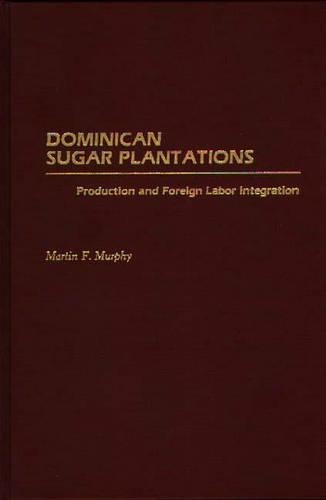
Dominican Sugar Plantations: Production and Foreign Labor Integration
(Hardback)
Publishing Details
Dominican Sugar Plantations: Production and Foreign Labor Integration
By (Author) Martin Murphy
Bloomsbury Publishing PLC
Praeger Publishers Inc
30th August 1991
United States
Classifications
Tertiary Education
Non Fiction
331.62729407293
Physical Properties
Hardback
200
Width 156mm, Height 235mm
482g
Description
Primarily focusing on the organization of production and labor use practices in the Caribbean's second largest sugar industry, this work's historical, macroeconomic, political, and sociocultural components depict the reality of today's Dominican sugar economy. The Dominican Republic has been radically altered by its internationally oriented sugar economy--its society and national culture transformed and its political, legal, and economic structures modified. This book describes the progressive replacement of national labor in the sugar industry by foreign workers. Comparing the three distinct sugar corporations, it concludes that all three exploited foreign labor. The study refutes modern slavery charges through social science theory and extensive field research. Depicting living and working conditions in the fields, it concludes that slavery charges are the result of superficial analyses of symbols. More in-depth analyses display one of the most extreme forms of superexploitation in the twentieth century. Addressing present-day labor utilization strategies in the Dominican Republic sugar plantation system, Martin Murphy focuses on three areas: the logic of production, foreign labor integration, and a comparative analysis of three corporations. His first two chapters provide an overview of the historic and contemporary Dominican sugar industry. Historical patterns of labor recruitment and use are then presented in Chapter 3. Chapter 4 describes the basic logic of production and use of various types of labor for the plantations of the 1980s. Murphy's last four chapters address the question of heavy reliance on Haitian labor: Chapter 5 provides a history of Haitian migration; Chapter 6 discusses factors of expulsion and attraction which condition present-day Haitian migration to Dominican fields; Chapters 7 and 8 conclude with questions of Haitian ethnicity and its relationship to production organization.
Author Bio
MARTIN F. MURPHY is Associate Professor of Anthropology and Departmental Fellow of the Helen Kellogg Institute for International Studies at the University of Notre Dame. He was also an Assistant Director of the Center for Latin American Studies at the University of Florida and a Special Professor at the Autonomous University of Santo Domingo (UASD). He lived in the Dominican Republic for five years and has authored three books and many articles on various aspects of Dominican and Haitian society and culture.
